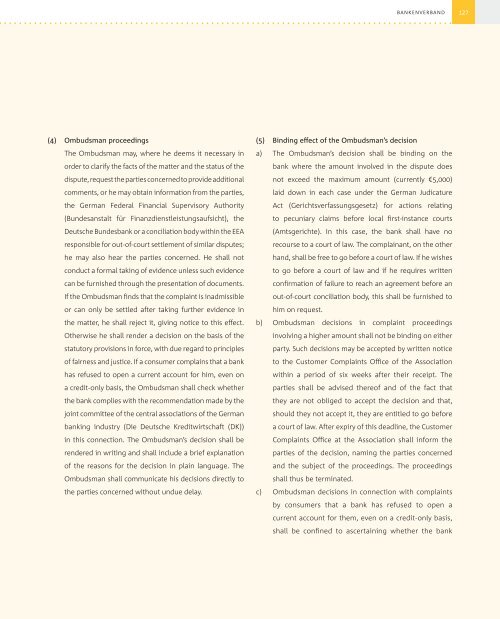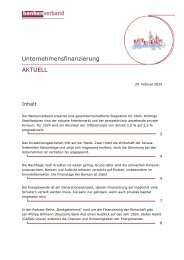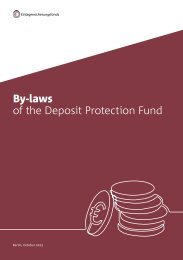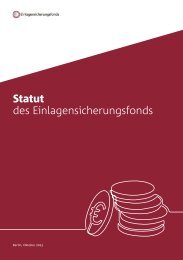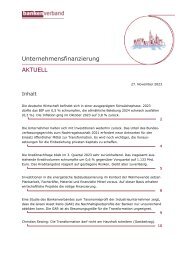Summary of the Ombudsman´s Report 2011
In 2012 we celebrate the 20th Anniversary of the German private commercial banks´ Ombudsman Scheme. When it launched its Ombudsman Scheme in 1992, making it the first leading German financial-sector association to do so.
In 2012 we celebrate the 20th Anniversary of the German private commercial banks´ Ombudsman Scheme. When it launched its Ombudsman Scheme in 1992, making it the first leading German financial-sector association to do so.
Create successful ePaper yourself
Turn your PDF publications into a flip-book with our unique Google optimized e-Paper software.
ankenverband 127<br />
(4) Ombudsman proceedings<br />
The Ombudsman may, where he deems it necessary in<br />
order to clarify <strong>the</strong> facts <strong>of</strong> <strong>the</strong> matter and <strong>the</strong> status <strong>of</strong> <strong>the</strong><br />
dispute, request <strong>the</strong> parties concerned to provide additional<br />
comments, or he may obtain information from <strong>the</strong> parties,<br />
<strong>the</strong> German Federal Financial Supervisory Authority<br />
(Bundesanstalt für Finanzdienstleistungsaufsicht), <strong>the</strong><br />
Deutsche Bundesbank or a conciliation body within <strong>the</strong> EEA<br />
responsible for out-<strong>of</strong>-court settlement <strong>of</strong> similar disputes;<br />
he may also hear <strong>the</strong> parties concerned. He shall not<br />
conduct a formal taking <strong>of</strong> evidence unless such evidence<br />
can be furnished through <strong>the</strong> presentation <strong>of</strong> documents.<br />
If <strong>the</strong> Ombudsman finds that <strong>the</strong> complaint is inadmissible<br />
or can only be settled after taking fur<strong>the</strong>r evidence in<br />
<strong>the</strong> matter, he shall reject it, giving notice to this effect.<br />
O<strong>the</strong>rwise he shall render a decision on <strong>the</strong> basis <strong>of</strong> <strong>the</strong><br />
statutory provisions in force, with due regard to principles<br />
<strong>of</strong> fairness and justice. If a consumer complains that a bank<br />
has refused to open a current account for him, even on<br />
a credit-only basis, <strong>the</strong> Ombudsman shall check whe<strong>the</strong>r<br />
<strong>the</strong> bank complies with <strong>the</strong> recommendation made by <strong>the</strong><br />
joint committee <strong>of</strong> <strong>the</strong> central associations <strong>of</strong> <strong>the</strong> German<br />
banking industry (Die Deutsche Kreditwirtschaft (DK))<br />
in this connection. The Ombudsman’s decision shall be<br />
rendered in writing and shall include a brief explanation<br />
<strong>of</strong> <strong>the</strong> reasons for <strong>the</strong> decision in plain language. The<br />
Ombudsman shall communicate his decisions directly to<br />
<strong>the</strong> parties concerned without undue delay.<br />
(5) Binding effect <strong>of</strong> <strong>the</strong> Ombudsman’s decision<br />
a) The Ombudsman’s decision shall be binding on <strong>the</strong><br />
bank where <strong>the</strong> amount involved in <strong>the</strong> dispute does<br />
not exceed <strong>the</strong> maximum amount (currently €5,000)<br />
laid down in each case under <strong>the</strong> German Judicature<br />
Act (Gerichtsverfassungsgesetz) for actions relating<br />
to pecuniary claims before local first-instance courts<br />
(Amtsgerichte). In this case, <strong>the</strong> bank shall have no<br />
recourse to a court <strong>of</strong> law. The complainant, on <strong>the</strong> o<strong>the</strong>r<br />
hand, shall be free to go before a court <strong>of</strong> law. If he wishes<br />
to go before a court <strong>of</strong> law and if he requires written<br />
confirmation <strong>of</strong> failure to reach an agreement before an<br />
out-<strong>of</strong>-court conciliation body, this shall be furnished to<br />
him on request.<br />
b) Ombudsman decisions in complaint proceedings<br />
involving a higher amount shall not be binding on ei<strong>the</strong>r<br />
party. Such decisions may be accepted by written notice<br />
to <strong>the</strong> Customer Complaints Office <strong>of</strong> <strong>the</strong> Association<br />
within a period <strong>of</strong> six weeks after <strong>the</strong>ir receipt. The<br />
parties shall be advised <strong>the</strong>re<strong>of</strong> and <strong>of</strong> <strong>the</strong> fact that<br />
<strong>the</strong>y are not obliged to accept <strong>the</strong> decision and that,<br />
should <strong>the</strong>y not accept it, <strong>the</strong>y are entitled to go before<br />
a court <strong>of</strong> law. After expiry <strong>of</strong> this deadline, <strong>the</strong> Customer<br />
Complaints Office at <strong>the</strong> Association shall inform <strong>the</strong><br />
parties <strong>of</strong> <strong>the</strong> decision, naming <strong>the</strong> parties concerned<br />
and <strong>the</strong> subject <strong>of</strong> <strong>the</strong> proceedings. The proceedings<br />
shall thus be terminated.<br />
c) Ombudsman decisions in connection with complaints<br />
by consumers that a bank has refused to open a<br />
current account for <strong>the</strong>m, even on a credit-only basis,<br />
shall be confined to ascertaining whe<strong>the</strong>r <strong>the</strong> bank


